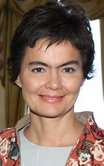María Eugenia Estenssoro
| María Eugenia Estenssoro | |
|---|---|
 María Eugenia Estenssoro in 2008 | |
| Argentine Senate | |
|
In office December 10, 2007 – December 10, 2013 | |
| Constituency | Buenos Aires City |
| Personal details | |
| Born |
April 15, 1958 La Paz, Bolivia |
| Nationality | Bolivian/Argentine |
| Political party | Civic Coalition |
| Residence | Buenos Aires, Argentina |
María Eugenia Estenssoro is a Bolivian Argentine politician, journalist and activist for women's rights. She represented the city of Buenos Aires in the Argentine Senate.
Estenssoro was born in La Paz. Her great-grandfather is credited with discovering oil in Bolivia and her grandfather founded the national oil company, YPFB. Her family also includes two former Presidents of Bolivia, Víctor Paz Estenssoro and Hugo Banzer. Her parents came to Argentina with her in 1964, and her father ran the Argentine oil company, YPF. She was raised in San Isidro, Buenos Aires and studied at the Northlands School. At 16 she continued her education in the United States, studying at Smith College, Massachusetts, and then in France at the Sorbonne and the Institut d'Études Politiques de Paris. She completed a postgraduate course in books and magazines at Harvard and a teaching course at Columbia University.
In May 1983 Estenssoro returned to Argentina. She began work at the magazine El Porteño and also worked for Time magazine, The Wall Street Journal and other US publications. She became editor of Mercado and then economics editor of Noticias. She founded a women's magazine and also worked in television.
Estenssoro was elected to the Buenos Aires city legislature in 2003 as an independent on the list of liberal party Recrear, under the wing of Patricia Bullrich. She was the first legislator of Bolivian descent in a city with a large Bolivian population.[1] Later she allied with the ARI party. In 2007 she became a senator for the Civic Coalition. Her alliance with the ARI party, as a centre-right politician, provoked a crisis within ARI ranks, with several ARI deputies resigning to form an 'Autonomous ARI' block in the Argentine Congress.
References
- ↑ Comunidad boliviana. "María Eugenia Estenssoro: Una boliviana fue elegida legisladora de Buenos Aires" (in Spanish).
External links
- Official site
- Senado de la Nacion Argentina [National Senate web page]
- Senadora María Eugenia Estenssoro Senate blog
- María Eugenia Estenssoro on Facebook
- Senator María Eugenia Estenssoro on Facebook